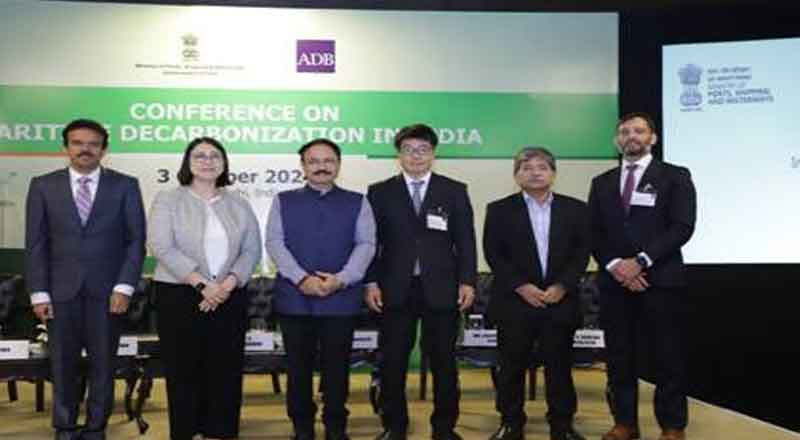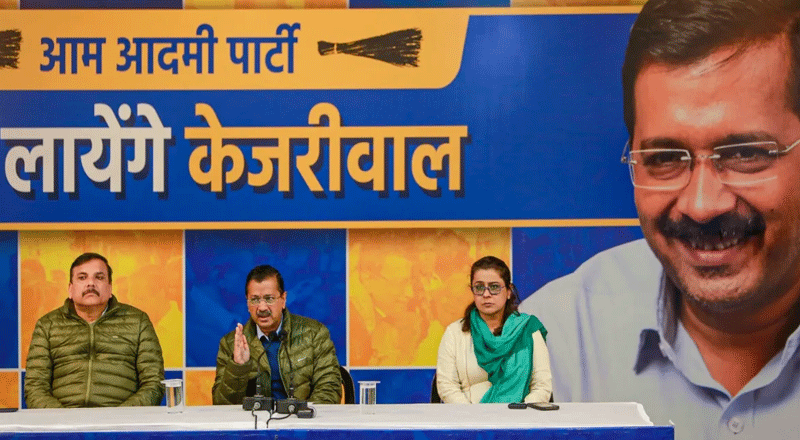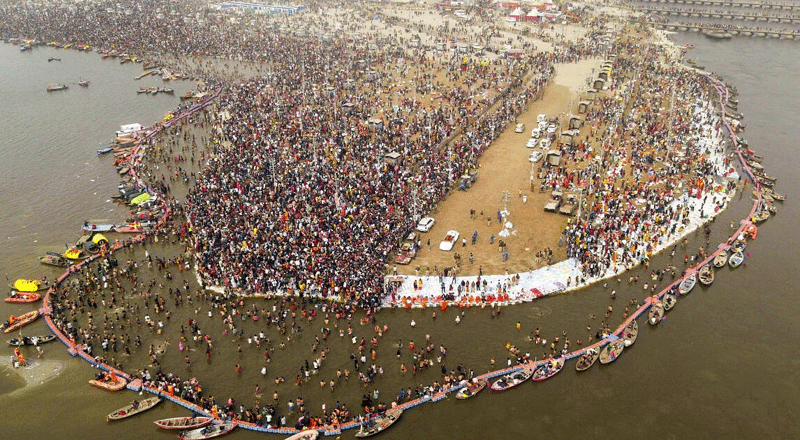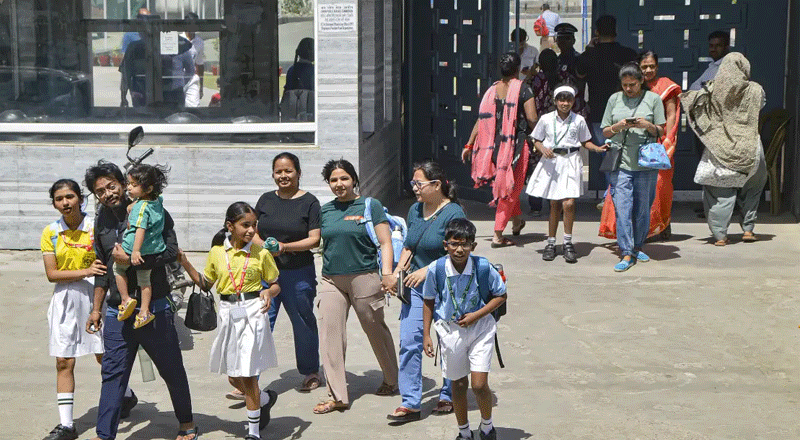The Conference on Maritime Decarbonization in India, co-hosted by the Ministry of Ports, Shipping & Waterways (MoPSW) and the Asian Development Bank (ADB), concluded today at Le Meridien, New Delhi. The event brought together over 200 delegates, including leaders from key Indian ports, central and state government officials, industry stakeholders, international experts, and academia to discuss the future of green shipping and port operations.
The conference underscored India’s commitment to achieving net-zero carbon emissions by 2070 and highlighted strategic initiatives to decarbonize its maritime sector, aligned with the Maritime India Vision 2030. Discussions covered a range of critical themes, including green port infrastructure, clean harbor craft, the use of zero-carbon fuels, emissions reduction strategies, and the electrification of inland waterways.
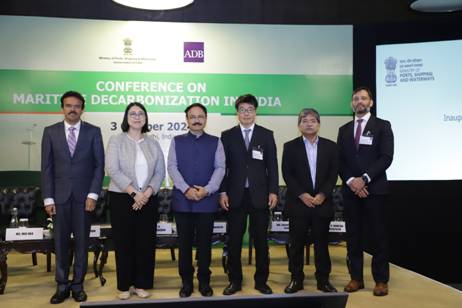
In his keynote address, Shri T. K. Ramachandran, Secretary, MoPSW, reinforced India’s determination to transform its maritime sector. He said “India’s maritime sector is not just a key driver of nation’s economy but also a critical player in our fight against climate change. Through initiatives like the Harit Sagar Green Port Guidelines and Harit Nauka Green Transition Guidelines, MoPSW is setting a global example in the adoption of green energy, sustainable port operations, and cleaner shipping practices. Our efforts today will define the maritime landscape of tomorrow, ensuring a balance between economic growth and environmental sustainability.”
“MoPSWs ambition to embrace low or zero-emission fuels and transform all vessels in Indian waters into green vessels by 2047 exemplifies forward-thinking approach to climate action and sustainable maritime practices”.
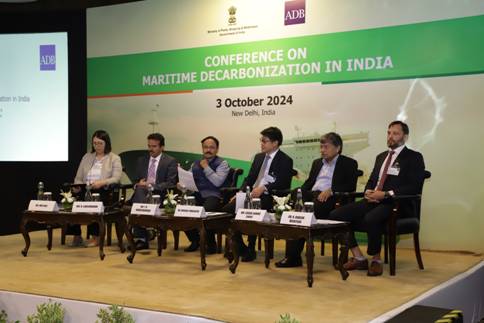
“The National Green Hydrogen Mission, with its goal of making India a global hub for green hydrogen production, reflects commitment to achieve net-zero emissions by 2070. By reducing carbon intensity and adopting ‘Working with Nature’ principles, MoPSW ensures that India’s maritime sector not only supports economic growth but also aligns with broader climate objectives, driving innovation and sustainability in every step”.
Ms. Mio Oka, Country Director for India at the Asian Development Bank (ADB), highlighted the pivotal role of the maritime sector in achieving India’s climate goals, underscoring ADB’s longstanding commitment to financing sustainable development. She emphasized ADB’s support in helping India reduce carbon intensity by 45% by 2030 and achieve net-zero emissions by 2070. Mr. Hiroaki Yamaguchi, Senior Director of the Transport Sector at ADB, echoed these sentiments, focusing on decarbonizing ports and shipping, and enhancing green corridors, positioning India’s maritime industry as a leader in global decarbonization efforts. Both reaffirmed ADB’s dedication to providing financial and technical assistance to support India’s green maritime transition.
One of the event’s highlights was a special session on Green Ports and Maritime Decarbonization, where experts shared knowledge and best practices for reducing the carbon footprint of Indian ports. The session included presentations from Ajay Kumar Singh, Head of DNV Maritime Advisory India, who discussed the role of smart ports in enhancing energy efficiency, and Lawrence Ong, Deputy Director of Maritime and Port Authority of Singapore, who shared insights into Singapore’s decarbonization journey.
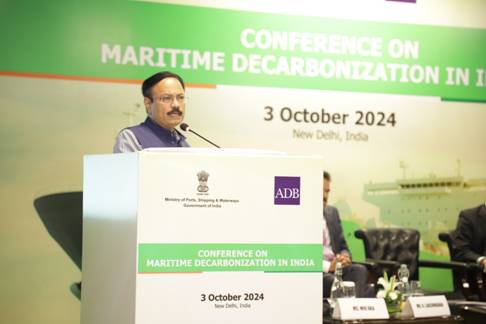
In another session, discussions focused on the role of zero-carbon fuels in maritime operations, with experts highlighting the need for early adoption of alternative fuels like green hydrogen and ammonia. Captain Prashant S. Widge of Maersk Line shared a shipowner’s perspective on the global challenges and opportunities in transitioning to green fuels, while Madhu Nair, CMD of Cochin Shipyard, presented the Indian experience with alternative fuels.
The conference also spotlighted Inland Waterways as a key area for decarbonization, with presentations from R. Lakshmanan, Joint Secretary (IWT), MoPSW, and P. J. Shaji, CGM of Kochi Water Metro, showcasing successful efforts in reducing emissions and improving efficiency in water-based transportation. Shri Lakshmanan also suggested transitioning to low-emission alternative fuels would help tapping into the complete potential of IWT as a sustainable transportation mode.
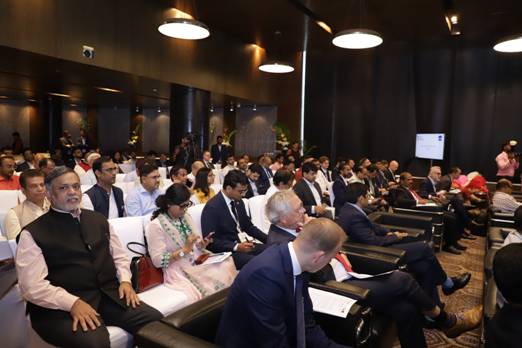
During the session Shri. R. Lakshmanan, Joint Secretary (Ports), MoPSW emphasized the importance of continued collaboration within the sector, to drive tangible progress toward achieving decarbonization goals in India’s maritime industry. He emphasized on MoPSW blueprint for Ecosystem Development for Green Hydrogen Production and Export at Major Ports.
The conference was expertly moderated by distinguished professionals from ADB and KPMG, ensuring insightful discussions and seamless coordination throughout the event. The conference concluded with a panel discussion moderated by Dr. Yesim Elhan-Kayalar, Advisor, ERDI, ADB, on India’s maritime decarbonization priorities and the path forward for sustainable and green shipping practices.
As part of the outcomes, the conference emphasized the need for continued collaboration between government bodies, industry leaders, and international organizations to achieve shared decarbonization goals. It also set the stage for further discussions on innovative financing models and regulatory frameworks that support green shipping and port development.
As India moves forward with its ambitious goals, the insights gained from the Conference on Maritime Decarbonization will play a crucial role in shaping policies and practices that contribute to a cleaner, greener maritime sector.


